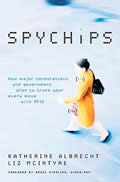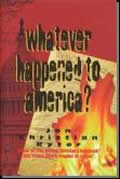Other
Ryter
Articles:
The Two Kerry's:
War Hero or
Traitor?
"Men in Black" The Cult of The Judges
YOU
JUST WON A CAZILLION BUCKS
PART 2 of 2
By Jon Christian Ryter
November 7, 2007
NewsWithViews.com
Computers should come with warning labels. People who are too stupid to keep from sharing critical information about their financial assets should not be allowed to own them. Here are a handful of real cybervictims and their stories. Let their bad experiences help you avoid the identity thieves and the confidence men.
Jill Parker and her husband decided to convert their upstairs into an apartment. They ran an ad on one of the Internet classified websites and received an answer from a man in Nigeria who said he worked for a corporation in England. The man said he was being transferred to Chicago. The first and last month's rent was $3,000.00. The scammer told Parker he had just received a $25,000 expense reimbursement check from his company and asked if he could send it. He said when the check cleared, they could send him a wire transfer for $22,000 and use $3,000 of the money for the first and last month rent. The Parkers agreed.
Their bank honored the check because Jill Parker's husband had his company account there, and usually carried a balance sufficient to cover the check. The Parkers wire-transferred $22,000 their new "tenant" who was planning, he said, to use the money to ship his belongings from Nigeria to Chicago. A few days before Christmas the Nigerian check bounced and the bank took deducted $25,000.00 from the Parker account. The Parkers were scammed out of $22,000 a few days before Christmas that year. Happy holidays.
Rebecca Woodworth's sister, Patrica Sowens, received an email stating she had won a European Lottery. Before Sowens killed herself, she drained her checking and savings accounts to pay the fees and taxes. Woodworth said Sowens sent the scam artists over $400 thousand in anticipation of receiving a multimillion dollar prize. Two days before her suicide, Sowens apparently learned she had been scammed. In her suicide note, Sowens, a writer-artist and a Tulane graduate, left a note to her sister, saying good-bye. In the note, she said "...I fell for a 419 lottery investment scam. All of the second guessing ignores the horror of my actual state of mind, the fear and panic, dullness and confusion. I can't ignore the shame and guilt. This is not going well..."
Julia Melton felt like the dummy of the year whem she got ripped off. In her case, she received a letter in the mail telling her she had won a Canadian Sweepstakes for $165 thousand. The "sweepstakes official" told Melton she would receive a check to cover all of the fees that needed to be paid by the recipient before the lottery officials would release the $165 thousand prize to her.
When she received the check, the sweepstakes officials were on the phone with her the same day, informing her that the $3,000 she owed in fees had to be mailed to the sweepstakes officials within 48-hours for them to release her prize money. Melton said she realizes now that the reason the "official" was so insistent is because he knew that within a matter of a few days at the most, the check he sent to cover the wire transfer would bounce, and if she had not wire-transferred the money before that happened, he would never get it.
Susan Jones thought she found true love on the Internet. Her true love, she thought, (from the photos he sent) was a good looking guy named Kenneth Cole who claimed he was building a shopping mall in Nigeria. When he found her, he sent her 12 dozen red roses. A short time later he sent her an Easter basket with a note professing his undying love Heartwarming. He was genuinely warm and sweet, she thought. Then one day she received a packet of money orders he wanted her to deposit in her account.
After she got the money orders she then received, over the Internet, a list of "the suppliers" Cole wanted US checks sent to. (The money orders came from a company called Allen Constructions. Jones was very surprised to get the bundle of money orders and wondered why he didn't have an accountant in Nigeria write checks to his suppliers. She deposited the money orders and wrote the checks. When the money orders started to bounce, Jones went to her bank where she learned the money orders were all counterfeit
Linda Kelly, who has her own business�an offshore website auction business�had a customer in an African nation who wanted to buy a $100 table from her website and have her ship it to him. She suggested that it would cost more to ship the table than it was worth. He agreed to pay whatever costs were needed to ship the table. She used PayPal, she said. He needed to go online and buy the table. He told her that he didn't trust PayPal and that he had a cashier's check in the amount of $3,500.00 that he would send instead. She could cash it, take whatever money was required to pay for the table�and money to cover her time�and wire-transfer the balance of the money to him.
Accustomed to sending and receiving certified checks, Kelly didn't see a problem. She would take the check to her bank, cash it, ship the table and send her customer his "change." She told him to send the check. When she received it, she took it to her local bank. They said since it was drawn on a foreign bank, the check would have to go through the clearing houses. They told her she would have to deposit the check and, by morning, she could access the funds. Kelly deposited the check, and proceeded to forget about it for four days. On the fourth day she received an angry email from the "customer," who asked why she hadn't sent him his money. Rattled, she dashed to the company she used to make wire transfers, and sent him his funds. Then she headed to her bank, a little farther down the road, and attempted to access funds from her account through her debit card.
Kelly was shocked to discover that she could not access her money with her debit card. The bank told her that there was a "problem" with the certified check she had deposited in her account. It was not going to clear the bank. Kelly realized immediately that she had been scammed. She dashed back to the company where she did the wire transfer only to learn that just about a minute before she walked back into the building, her wire transfer went through. Linda Kelly was out about $3,200.00.
Shannon Callahan was having a hard time financially because her mother was suffering from a terminal illness, and she was told, her mother would die within six months. Because her mother required 24-hour care, Callahan took a leave of absence to care for her mother. A month or so before her mother died, Callahan received an email from someone overseas who told Callahan she was an artist who sold her paintings to clients in the United States. The clients, she said, paid her with money orders which she had trouble cashing them because they were American money orders. She told Callahan she needed to be paid by wire transfer. Why it never dawned on Callahan to inquire why it was she wasn't asking her US customers to send wire transfers instead of mailing money orders can probably be blamed on her mother's terminal condition�and Callahan's panic mode need to bring some income into the household. Had she thought about it, Callahan should have seen the con. She didn't because the woman offered to pay her an override to cash her checks and wire transfer the funds to her.
Tragically, her mother died at about the same time the money orders started bouncing. Her mother was gone, and so was her life. Her sister�who also suffered the loss of her mother�had to bail Callahan out of trouble. It is unclear how much money Callahan lost since the total loss had to be calculated not only on the amount she wire-transferred to the scam artist, but the amount of "commission" she had written checks against�and the check charges from her bank and those local businesses where Callahan purchased those things she needed for her home.
As I said earlier, there are as many scams as there are con artists using them to trick US consumers�who are viewed by con artists in the third world as the most gullible people�into parting with their hard-earned money. Most of those who are scammed stopped believing in Santa Claus and the tooth fairy decades ago. But, almost weekly, they read in the newspaper or see on TV that someone just won anywhere from $15 to $350 million in the Power Ball Lottery or Super Lotto. So, why not them?
Many of the scams come from foreign countries. The con men pretend to be businesspeople or government officials�or recently deposed officials trying to get their ill-gotten gains out of the country. The crux of every scam, regardless of the suit of clothes the scam wears is to get you to cash a check or money order and wire transfer those funds back to them. The reasons they can't cash the checks are as varied as the schemes themselves. One variable remains constant in every scenario�if you cash their check and wire transfer them money, you are going to lose whatever you send.
The con artists are generally pretty good. After all, that is how they "earn" their living. Sometimes they target their victims through organizations or churches by developing sales pitches aimed that a particular demographics. That way, its easier for the con artist to play on your emotions. But the best scam is still the lottery or sweepstakes Most people fall for it because they fail to realize that its illegal for foreign lotteries or sweepstakes to sell tickets in the United States�even though it doesn't seem to dawn on those who win that they never bought a ticket. That's why the email lottery is the best scam�particularly since everyone thinks the Internet financial gurus all have enough loose change laying around to sponsor multimillion dollar giveaways to attract users.
Because the potential for a big score exists with the cyberidiots who will accept the fact that they just won a nonexistent email sweepstakes they never entered, more con artists use those types of scams. Scammers in Canada and Mexico send their notices by regular mail, by phone or email. But, the one element that remains constant is that they are going to have you send them a wire transfer.
Why a wire transfer and not a check? Because once a wire transfer is sent, it can't be canceled and it can't be recalled. Just as Linda Kelly learned one minute after her wire transfer was sent, it can't be canceled. You can't call and put a hold on the money because its already in someone else's account somewhere else in the world.
|
Subscribe to the NewsWithViews Daily News Alerts! |
If you believe you have been approached by an Internet con-man�or one who has made the serious blunder of using the US Mail, you need to contact the National Consumers League's Fraud Center. Use the online form they provide to report suspected fraud. You can find the form here. Use this form for either telemarketing fraud or Internet fraud. If you receive these types of offers through the mail, contact your local USPS office and ask for a US Postal Inspector. For part one click below.
Click
here for part -----> 1,
� 2007 Jon C. Ryter - All Rights
Reserved
[Read "Whatever Happened to America?"]
Sign Up For Free E-Mail Alerts
E-Mails
are used strictly for NWVs alerts, not for sale
Jon Christian Ryter is the pseudonym of a former newspaper reporter with the Parkersburg, WV Sentinel. He authored a syndicated newspaper column, Answers From The Bible, from the mid-1970s until 1985. Answers From The Bible was read weekly in many suburban markets in the United States.
Today, Jon is an advertising executive with the Washington Times. His website, www.jonchristianryter.com has helped him establish a network of mid-to senior-level Washington insiders who now provide him with a steady stream of material for use both in his books and in the investigative reports that are found on his website.
E-Mail: BAFFauthor@aol.com
What amazes me most is that my email provider does not have a system for reporting con men to them, or an ISP-provided email address to forward attempts to defraud American citizens (complete with all routing information) to the FBI or someone else who can do something more than commiserate with me when I lose my shirt.













